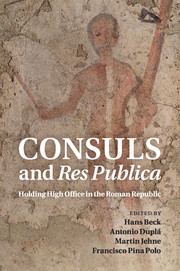Book contents
- Frontmatter
- Contents
- Preface
- Contributors
- The republic and its highest office: some introductory remarks on the Roman consulate
- Part I The creation of the consulship
- Part II Powers and functions of the consulship
- Part III Symbols, models, self-representation
- Part IV Ideology, confrontation and the end of the republican consulship
- Chapter 12 Consular appeals to the army in 88 and 87: the locus of legitimacy in late-republican Rome
- Chapter 13 Consules populares
- Chapter 14 The consulship of 78 bc. Catulus versus Lepidus: an optimates versus populares affair
- Chapter 15 Consulship and consuls under Augustus
- Bibliography
- Index of persons
- Subject index
Chapter 14 - The consulship of 78 bc. Catulus versus Lepidus: an optimates versus populares affair
from Part IV - Ideology, confrontation and the end of the republican consulship
Published online by Cambridge University Press: 07 September 2011
- Frontmatter
- Contents
- Preface
- Contributors
- The republic and its highest office: some introductory remarks on the Roman consulate
- Part I The creation of the consulship
- Part II Powers and functions of the consulship
- Part III Symbols, models, self-representation
- Part IV Ideology, confrontation and the end of the republican consulship
- Chapter 12 Consular appeals to the army in 88 and 87: the locus of legitimacy in late-republican Rome
- Chapter 13 Consules populares
- Chapter 14 The consulship of 78 bc. Catulus versus Lepidus: an optimates versus populares affair
- Chapter 15 Consulship and consuls under Augustus
- Bibliography
- Index of persons
- Subject index
Summary
Introduction
It has long been known, if not always plainly stated, that the Roman elite commonly described in our sources as optimates acted in support and defense of the Sullan constitution, interpreted as the traditional republican settlements centered on the senate. However, what scholars have failed to see is that such support for the Sullan arrangements could be justified in the political conflicts of the first century bc by recourse to Stoic language, which in this period was widely familiar to the educated elite and informed Roman political discourse. The aim of this paper is to show that Stoicism provided the basis for many of the conventional ethical assumptions held by the Roman optimates and constituted an important part of their ideological tradition, which could indeed be mobilized to support and defend the Sullan constitutional settlements. To demonstrate this, I shall attempt to reconstruct and articulate the ideological premises of the language that politicians such as Catulus employed in their political careers.
Throughout his career, Catulus sought to preserve the Sullan political order against those forces that threatened its existence. In his consulship in 78 bc, he opposed his colleague Lepidus, who, after initial hesitation, dedicated the rest of his year in office to opposing and dismantling the Sullan constitutional arrangements.
- Type
- Chapter
- Information
- Consuls and Res PublicaHolding High Office in the Roman Republic, pp. 299 - 318Publisher: Cambridge University PressPrint publication year: 2011
- 2
- Cited by



